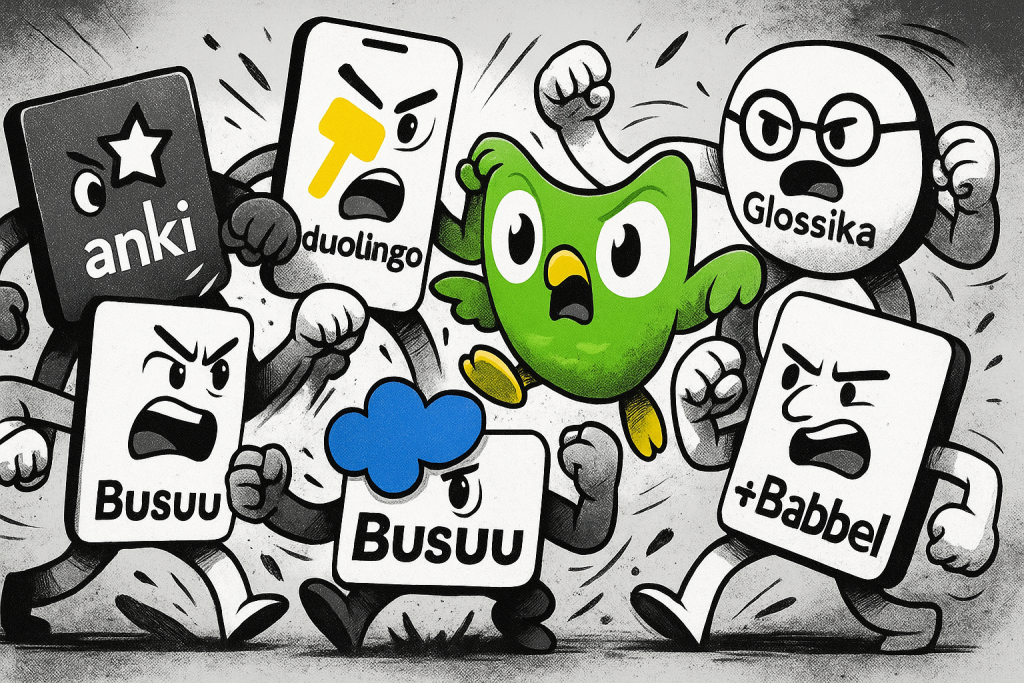In 2025, choosing the right language learning app can make or break your progress — especially if you’re aiming for long-term retention and fluency. While flashy interfaces and gamified lessons grab attention, what truly matters for mastering a language is how your memory is trained.
That’s where Spaced Repetition Systems (SRS) come in. Based on how the human brain forgets and recalls information, SRS ensures you review material at the exact moment you’re about to forget it. And when this technique is powered by artificial intelligence, it becomes even more powerful — adapting to your pace, memory patterns, and goals in real time.
But not all apps that claim to use spaced repetition actually do. Some rely on fixed review schedules, others on passive exposure without real memory tracking. That’s why we’ve reviewed 12 of the most popular language learning apps, focusing on one key question:
Which apps truly use SRS — and which only pretend to?
In this article, you’ll find clear comparisons, in-depth reviews, and a verdict tailored to your learning needs. Whether you’re looking for full-sentence fluency, word recall, or custom control over your schedule, you’ll know exactly which language learning app to choose — and which ones to avoid.
- What Makes a Good Spaced Repetition App in 2025?
- Which Language Learning App Does Spaced Repetition Best?
- Taalhammer – Full-Sentence Spaced Repetition with Adaptive AI
- Anki – Powerful Manual SRS for Experienced Users
- Glossika – Language Learning App with Sentence-Based Passive Review
- Lingvist – Word-Level SRS with Transparency
- Duolingo & Busuu – Basic SRS for Casual Learners
- Apps with Limited or Non-Adaptive SRS
- Verdict – Which Language Learning App Should You Choose for Spaced Repetition in 2025?
- Taalhammer – Language Learning App with Best All-Round SRS System
- Anki – Best DIY SRS Tool for Power Users
- Glossika – Language Learning App Useful for Sentence Exposure, Not Active Recall
- Lingvist – Word-Based SRS with Clean Feedback
- Duolingo & Busuu – Casual Tools with Limited Spacing Logic
- Apps That Don’t Offer True SRS (Despite Marketing Claims)
- Final Thought on Best Language Learning App with SRS
- FAQ – AI and Spaced Repetition in Language Learning Apps
What Makes a Good Spaced Repetition App in 2025?
To understand which language learning app truly supports your progress, it helps to know what effective spaced repetition looks like — especially now that AI plays a growing role in how we learn.
Active Recall Beats Passive Review
The core idea behind spaced repetition is simple: you remember things better when you’re challenged to recall them, not just re-read or re-hear them. Language learning app that ask you to type, speak, or construct full sentences give your brain a chance to retrieve information — strengthening memory far more than passive exposure alone.
That’s why systems based solely on listening or swiping through words tend to plateau your progress. True SRS apps push you to recall — not just recognize.
AI-Powered Spacing Adjusts to Your Brain
Not everyone forgets at the same rate. That’s where AI-driven spaced repetition systems come in. Instead of showing the same material every few days on a fixed schedule, AI can detect when you’re about to forget a word or phrase — and resurface it just in time.
This kind of adaptivity is critical for long-term retention, especially as your vocabulary grows. The best apps use your performance to adjust what, how often, and in what context you review material.
Sentences Matter More Than Words
Memorizing isolated words can help you get started, but it won’t get you to fluency. A good SRS app will introduce vocabulary in full sentences, so you learn not just the meaning, but also how the word works in context — grammatically, stylistically, and culturally.
Some apps stop at word lists. Others, like Taalhammer and Glossika, build your memory through real, usable phrases, creating stronger recall and real-world fluency.
If you want to know which apps actually let you learn in full sentences, you can read the linked article in which I compared 12 apps in terms of which ones do it best.
Transparency and Learner Control
How much control do you have over your learning path? Can you add your own content, choose what to review, or override the algorithm? Do you know how the language learning app is deciding what you’ll see next?
The best apps are clear about how their systems work — and give you options to adjust them. Whether you’re a beginner or a power user, you should be able to influence your learning loop.
Looking for a language app that lets you decide what to learn? Many claim to offer customization, but few actually let you build and review your own content effectively. In this detailed comparison of 12 language learning apps that support user-generated content, you’ll find out which tools give you true creative control – and which only simulate it.
Which Language Learning App Does Spaced Repetition Best?
Not all SRS is created equal. Some apps fine-tune your review based on how fast you forget. Others just cycle content through loosely timed loops. Below, we break down how the top apps stack up — and why only a few truly deliver on their promises.
Taalhammer – Full-Sentence Spaced Repetition with Adaptive AI
Taalhammer stands out by combining AI-powered, memory-based spacing with sentence-level learning. Unlike most tools, it doesn’t just teach isolated vocabulary. Instead, it gets you to recall and produce full phrases, reinforcing grammar, usage, and meaning together.
What makes it especially powerful:
- Learner-driven content: you can create, edit, and schedule your own material.
- Adaptive engine: reviews surface exactly when you’re most likely to forget.
- Sentence-first approach: vocabulary is always embedded in real language use.
This combination builds long-term fluency, not just recognition. It’s especially valuable for intermediate learners and those who want to speak naturally.
Anki – Powerful Manual SRS for Experienced Users
Anki offers one of the most robust SRS engines available — if you know how to use it. It lets you build fully custom flashcards and controls every detail of the spacing algorithm. But it’s not beginner-friendly.
Anki is:
- Highly customizable, but requires technical setup.
- Great for adding your own sentences or grammar patterns.
- Best suited for users comfortable with tweaking settings and importing decks.
If you have the motivation to build or curate your own learning material, Anki can be a flexible and powerful SRS tool.
Taalhammer vs Anki – SRS Power vs SRS Simplicity
Taalhammer delivers AI-powered spaced repetition with full-sentence recall, all set up and ready to use from the start.
Anki gives you full control over every card and interval, but requires technical setup, time, and experience to use effectively.
If you’re focused on fluency and want to spend more time learning than configuring, Taalhammer offers a smoother, smarter path — no spreadsheets, plugins, or guesswork needed.
Glossika – Language Learning App with Sentence-Based Passive Review
Glossika focuses entirely on listening and repeating native sentences. It’s built on the idea that exposure to whole phrases builds intuition. But there’s a catch: you can’t edit or create content, and the review intervals are not adaptive.
Use it if you want:
- Lots of exposure to natural sentence structure.
- Passive listening with some speaking repetition.
Just don’t expect control over what you review or when.
Taalhammer vs Glossika – Active Recall vs Passive Exposure
Glossika helps you absorb language through repetition of native sentences, but offers no control over content or review timing.
Taalhammer builds on the same sentence-based approach, but adds AI-powered spacing and full customization.
If you want to internalize grammar and actively recall what you’ve learned, Taalhammer offers a more dynamic, learner-driven experience.
Lingvist – Word-Level SRS with Transparency
Lingvist does SRS well — at the word level. It uses AI to track which words you’re struggling with and adjusts review frequency. What sets it apart is the clear progress metrics and elegant design.
Highlights:
- Tracks known vs unknown words dynamically.
- No sentence practice — just isolated words.
- Ideal for beginners who want quick vocabulary building.
Taalhammer vs Lingvist – Sentences vs Isolated Words
Lingvist uses spaced repetition to track your vocabulary progress, focusing on individual words and quick review. Taalhammer goes further by anchoring words in full sentences and adapting reviews to your memory curve.
For learners aiming to speak naturally and retain structures, Taalhammer offers deeper, more contextual learning.
Duolingo & Busuu – Basic SRS for Casual Learners
Both Duolingo and Busuu offer light forms of repetition. Duolingo encourages practice through gamification and gentle nudges. Busuu includes scheduled reviews and feedback from native speakers.
Use them if:
- You’re just starting out.
- You want motivation more than precision.
- You’re learning on the go and don’t need deep control.
Neither app offers truly adaptive, memory-based SRS — but they do help keep you engaged.
Taalhammer vs Duolingo vs Busuu – Depth vs Motivation
Duolingo and Busuu keep you engaged with gamified practice and short reviews, but their SRS is shallow and often fixed.
Taalhammer, by contrast, uses adaptive AI to schedule full-sentence reviews based on your memory — no fluff, just lasting learning.
If you want long-term fluency with real control, Taalhammer offers more depth than either app’s motivational features can reach.

Apps with Limited or Non-Adaptive SRS
Some apps mention “repetition” but don’t actually schedule reviews based on forgetting curves. Instead, they rely on fixed cycles, content exposure, or tutor-led feedback. These include:
- Rosetta Stone – fixed sequence, no adaptive review.
- Drops – frequent word exposure, no memory tracking.
- Italki – relies on tutors; no review engine.
- LingQ – content-focused; review based on frequency, not performance.
- Quizlet (Free) – passive flashcard review unless upgraded.
These tools may help with exposure or comprehension, but they don’t meet the standard of true spaced repetition.
Verdict – Which Language Learning App Should You Choose for Spaced Repetition in 2025?
After reviewing 12 of the most popular language learning apps, one thing is clear: while many mention spaced repetition, only a few use it in a way that actually supports long-term memory and fluency. And only one gives you full control, sentence-based learning, and AI-driven memory scheduling in one system.
Taalhammer – Language Learning App with Best All-Round SRS System
Taalhammer goes far beyond vocabulary drills. It combines:
- Adaptive AI that tracks your memory and adjusts reviews precisely,
- Sentence-based learning that helps you produce, not just recognize,
- And complete user control over what you learn and how.
This makes it the most well-rounded choice for anyone serious about long-term retention and real-life language use — not just gamified practice.
Use Taalhammer if:
- You want to build fluency, not just vocabulary.
- You want to review at the right time — based on science, not habit.
- You value both smart automation and control over your learning.
Anki – Best DIY SRS Tool for Power Users
Anki has long been trusted by learners who like to customize everything. With full manual control over intervals and content, it’s incredibly flexible — but also technical and time-consuming to set up.
It’s a strong option for experienced learners who want to build or download custom decks. However, without native sentence guidance or AI, it lacks the language-focused structure and adaptivity that Taalhammer offers by default.
Glossika – Language Learning App Useful for Sentence Exposure, Not Active Recall
Glossika exposes you to native-sounding phrases through repetition and audio drills. It’s a passive system — which can help with rhythm and pronunciation — but you can’t edit content or track memory in a personalized way.
It’s helpful for listening practice, but not a complete SRS experience on its own.
Lingvist – Word-Based SRS with Clean Feedback
Lingvist offers adaptive repetition of vocabulary, and it does this quite well. You’ll see smart review intervals and detailed feedback on word progress. However, it doesn’t support sentence construction or custom content, so it’s best for beginners or passive vocabulary review — not active output.
Duolingo & Busuu – Casual Tools with Limited Spacing Logic
Duolingo and Busuu offer some reminders and repeat activities, but these systems are better at keeping you engaged than at helping you remember long-term. If you’re just getting started or learning casually, they may be helpful.
But if you want a memory system that truly works, they don’t go far enough.
Apps That Don’t Offer True SRS (Despite Marketing Claims)
A number of apps mention repetition — but without adaptive spacing, memory tracking, or active recall, they don’t meet the standard of a true spaced repetition system:
- Rosetta Stone – fixed review, no personalization
- Drops – word swiping, not memory recall
- Quizlet (Free) – passive review only
- LingQ – content exposure, not recall-based intervals
- Italki – great for practice with tutors, but no review system
These can be good supplements — especially Italki for speaking — but you’ll need to pair them with a true SRS engine like Taalhammer to build reliable retention.
Final Thought on Best Language Learning App with SRS
If your goal is to speak fluently, remember naturally, and stay in control, Taalhammer is the only language learning app that connects the science of spaced repetition with the real demands of language fluency. Other tools can support niche goals — but only Taalhammer delivers all the elements of effective SRS in one system.
FAQ – AI and Spaced Repetition in Language Learning Apps
What is spaced repetition, and why does it matter?
Spaced repetition is a memory technique that helps you remember things for the long term by reviewing them at increasing intervals — just before you’re about to forget. It’s proven to dramatically improve retention compared to massed learning. Apps that use it properly help you waste less time and remember more.
Does every language learning app use spaced repetition?
No. Many apps say they use repetition, but only a few implement true SRS — that is, reviewing content based on your performance and memory decay curve. Tools like Taalhammer, Anki, and Lingvist do this well. Others like Duolingo, Quizlet (free), or Rosetta Stone rely on fixed schedules or passive exposure, which may not help long-term memory.
Can AI make spaced repetition more effective?
Yes. Traditional SRS uses preset intervals, but AI-enhanced SRS, like in Taalhammer, tracks how well you remember specific items and adjusts the timing in real time. This makes your review sessions more efficient — you see the right sentence at the right time, not just what the language learning app wants to show next.
Is spaced repetition enough to become fluent?
Spaced repetition helps you retain vocabulary and grammar — but fluency also depends on using language in context. That’s why apps like Taalhammer, which combine SRS with full-sentence production and listening, offer a more complete fluency path than word-based tools.
Which SRS language learning app is best for beginners?
If you’re new to learning languages, Taalhammer offers the easiest entry point into adaptive SRS with real language use, no setup required. Anki is powerful but requires manual configuration. Duolingo or Busuu can be good motivational tools, but lack deep SRS logic.
Can I use more than one language learning app?
Yes — and many learners do. You can combine apps depending on your goals:
- Use Taalhammer for fluency and full-sentence memory.
- Pair it with Italki for speaking practice.
- Use Anki if you enjoy building custom decks — but expect more setup time.
Just make sure at least one app you use has real spaced repetition, not just review for the sake of review.








